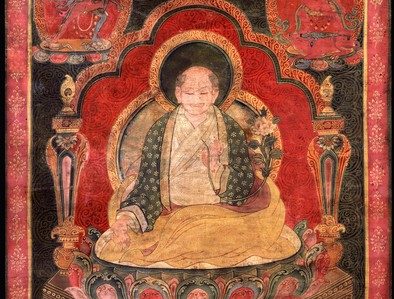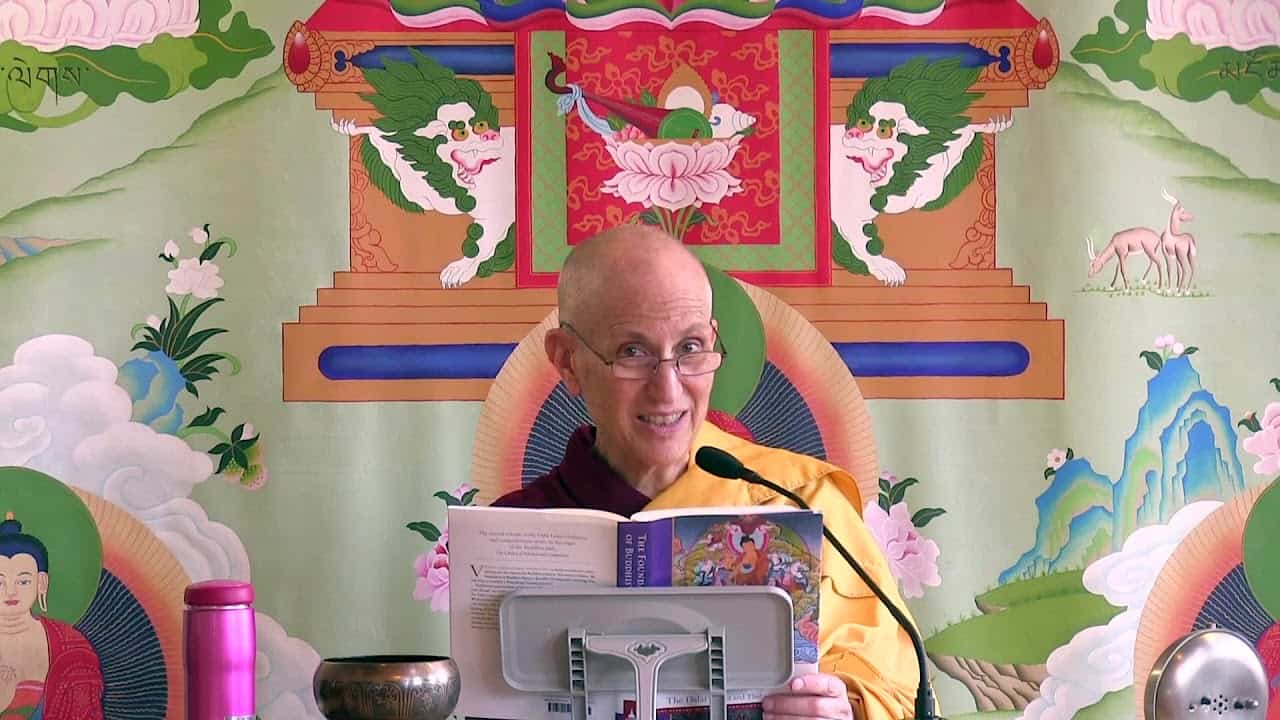༄༅། །ནུབ་པ་རིག་འཛིན་གྲགས་ཀྱིས་མཛད་པའི་ཞེན་པ་བཞི་བྲལ་བཞུགས། །
༄༅། །ནུབ་པ་རིག་འཛིན་གྲགས་ཀྱིས་མཛད་པའི་ཞེན་པ་བཞི་བྲལ་བཞུགས། །

ཞེས་པ་རྣལ་འབྱོར་གྱི་དབང་ཕྱུག་གྲགས་པ་རྒྱལ་མཚན་གྱི་གསུང་ཞེན་པ་བཞི་བྲལ་གྱི་གདམས་པ་ཨྠིྀ།། This instruction on freedom from the four fixations was spoken by the lord of yogis Drakpa Gyaltsen.
༄༅། །ན་མོ་གུ་རུ།
Homage to the guru!
རྗེ་བཙུན་ཆེན་པོ་ས་སྐྱ་པའི་ཞལ་ནས། མྱ་ངན་ལས་འདས་པའི་བདེ་བ་ཆེན་པོ་མཆོག་དོན་དུ་གཉེར་བར་འདོད་པ་རྣམས་ཀྱིས་ཞེན་པ་བཞི་དང་བྲལ་དགོས་ཏེ། འདི་ལ་ཞེན་པ་བཞི་ནི། ཚེ་འདི་ལ་ཞེན་པ། ཁམས་གསུམ་འཁོར་བ་ལ་ཞེན་པ། བདག་གི་དོན་ལ་ཞེན་པ། དངོས་པོ་དང་མཚན་མ་ལ་ཞེན་པའོ། །
From the mouth of the great Venerable Sakyapa: those who wish to seek the supreme great bliss of nirvāṇa must separate from the four fixations. These four fixations are
- being fixated on this life,
- being fixated on the three realms of cyclic existence,
- being fixated on your own welfare,
- being fixated on [inherently existent] things and characteristics.
དེའི་གཉེན་པོའང་བཞི་སྟེ། ཞེན་པ་དང་པོའི་གཉེན་པོར་འཆི་བ་མི་རྟག་པར་བསྒོམ་པ། གཉིས་པའི་གཉེན་པོར་འཁོར་བའི་ཉེས་དམིགས་དྲན་པ། གསུམ་པའི་གཉེན་པོར་བྱང་ཆུབ་ཀྱི་སེམས་དྲན་པ། བཞི་པའི་གཉེན་པོར་ཆོས་ཐམས་ཅད་རྨི་ལམ་སྒྱུ་མ་ལྟ་བུར་བདག་མེད་པར་དྲན་པའོ།
Their antidotes are four as well:
- as the antidote to the first fixation, meditate on death and impermanence;
- as the antidote to the second, reflect on the faults of cyclic existence;
- as the antidote to the third, reflect on bodhicitta;
- as the antidote to the fourth, reflect on all phenomena as selfless, like dreams or illusions.
དེ་ལྟར་དྲན་ཞིང་གོམས་པར་བྱས་པའི་འབྲས་བུ་བཞི་འབྱུང་སྟེ། ཆོས་ཆོས་སུ་འགྲོ་བ། ཆོས་ལམ་དུ་འགྲོ་བ། ལམ་འཁྲུལ་པ་སེལ་བ། དེ་ལྟར་ཤེས་ཤིང་གོམས་པའི་འབྲས་བུ་འཁྲུལ་བ་ཡེ་ཤེས་ཕུན་སུམ་ཚོགས་པའི་སངས་རྒྱས་འབྱུང་ངོ༌།
Four effects of such reflection and familiarization arise:
- that your practice approaches the Dharma,
- that your practice approaches the path,
- that mistakes on the path are eliminated,
- and—the [main] effect of such understanding and familiarization—that mistaken [mind] arises as a Buddha’s marvelous collection of wisdom.
དེ་ལ་དང་པོ་ཚེ་འདི་ལ་ཞེན་པའི་གཉེན་པོ་འཆི་བ་མི་རྟག་པ་དྲན་པ་ནི། ནམ་འཆི་ཆ་མེད་པར་བསམ། འཆི་རྐྱེན་མང་བར་བསམ། འཆི་བ་ལ་ཅིས་ཀྱང་མི་ཕན་པར་རྒྱས་པར་བསམ་མོ། །དེ་ལྟར་བསམ་པ་གཅིག་སྐྱེས་ནས་སྙིང་ནས་ཆོས་གཅིག་བྱེད་འདོད་འོང་སྟེ། དེ་དུས་ན་ཆོས་སུ་འགྲོ་བ་ཡིན་ནོ།
First, the antidote to being fixated on this life, reflection on death and impermanence:
- contemplate that the time of death is indefinite,
- contemplate that the conditions for death are many,
- contemplate extensively that at the time of death you will not be benefited by anything at all [except the Dharma].
Having generated these thoughts just in this way, you will come to desire from the heart to practice only Dharma. At that time, [your practice] approaches the Dharma.
དེ་ནས་ཁམས་གསུམ་འཁོར་བ་ལ་ཞེན་པའི་གཉེན་པོར་འཁོར་བའི་ཉེས་དམིགས་དྲན་པ་ནི། དེ་ལྟར་ཚེ་འདི་ལ་ཉེས་པ་དེ་ལྟར་འདུག་ཀྱང༌། གཞན་འཁོར་ལོས་བསྒྱུར་བ་དང༌། ཚངས་པ་དང་བརྒྱ་བྱིན་ལ་སོགས་པ་ཀུན་བདེ་བ་མཆོག་ཡིན་ནམ་སྙམ་ན། མ་ཡིན་ཏེ། དེ་རྣམས་ཀྱང་སྡུག་བསྔལ་གྱི་རང་བཞིན་ལས་མ་འདས་པ་སྟེ། དེ་རྣམས་ཀྱི་ཚེ་དང་ལོངས་སྤྱོད་བསྐལ་པ་དུ་མར་གནས་ཤིང་རྒྱས་ཀྱང་མཐར་འཆི་ཞིང་འཇིག་སྟེ། མནར་མེད་པའི་སེམས་ཅན་དམྱལ་བར་སྐྱེ་བའི་ཉེན་ཡོད་པས་ན། དེ་ཐམས་ཅད་ཀྱང་སྡུག་བསྔལ་གྱི་རང་བཞིན་ལས་མ་འདས་སྙམ་དུ་བསམ་ཞིང་གོམས་པ་ན་ཆོས་ལམ་དུ་འགྲོ་བ་གཅིག་ཡོད་དེ། ཁམས་གསུམ་སྡུག་བསྔལ་གྱི་རང་བཞིན་ལས་མ་འདས་པར་འདུག་པས། མྱ་ངན་ལས་འདས་པའི་བདེ་བ་ཅིག་རང་དགོས་སྙམ་པའི་བློ་སྐྱེ་ཞིང༌། ལམ་ཐམས་ཅད་དེའི་དོན་དུ་བསྒྲུབ་པ་གཅིག་འོང་ངོ༌།།
Then, as the antidote to being fixated on the three realms of cyclic existence, reflect on the faults of cyclic existence. Accordingly, you may wonder, “Although this life has such faults, isn’t it that others—wheel-turning monarchs, Brahmā, Śakra, and so forth—all are supremely blissful?” No, they also do not pass beyond the nature of duḥkha. Their lives last for many eons but end in death, and their resources are extensive but end in destruction. Further, there is the danger of birth as a hell being in the Hell Without Respite. Therefore, when you have considered and become familiar with the thought that even all these [beings] do not pass beyond the nature of duḥkha, you become one whose practice approaches the path. Since the three realms do not pass beyond the nature of duḥkha, generate an awareness that thinks, “I need the bliss of nirvāṇa,” and become one who practices all paths for the sake of that.
དེ་ལྟར་རྒྱུད་ལ་སྐྱེས་ཀྱང་བྱང་ཆུབ་ཀྱི་སེམས་དང་མི་ལྡན་པས་བདག་གཅིག་བུ་བདེ་བ་དོན་དུ་གཉེར་ན། དགྲ་བཅོམ་པའམ། རང་སངས་རྒྱས་སུ་འགྱུར་བས་ན་བདག་གི་དོན་ལ་ཞེན་པའི་གཉེན་པོར་བྱང་ཆུབ་ཀྱི་སེམས་དྲན་པ་ནི། དེ་ལྟར་ཁམས་གསུམ་སྡུག་བསྔལ་གྱི་རང་བཞིན་འདི་ལས་བདག་གཅིག་བུ་གྲོལ་བས་མི་ཕན་ཏེ། སེམས་ཅན་འདི་རྣམས་རེ་རེ་ནས་བདག་གི་ཕ་དང་མ་མ་བྱས་པ་མེད་པས་འདི་རྣམས་ཀྱིས་མྱ་ངན་ལས་འདས་པའི་བདེ་བའི་མཆོག་ཐོབ་ན། བདག་བསྐལ་པ་ནས་བསྐལ་པའི་བར་དུ་དམྱལ་བའི་སེམས་ཅན་དུ་སྐྱེས་ཀྱང་སླའི་སྙམ་པའི་བློ་གོམས་ཤིང་སྐྱེས་ཙམ་ན། ལམ་གྱི་འཁྲུལ་བ་དང་པོ་བདག་གི་དོན་ལ་ཞེན་པ་སེལ་བ་ཡིན་ནོ།
Although you have generated [this awareness] in your continuum in this way, if you seek the bliss of yourself alone due to not being endowed with bodhicitta, you will become a [Hearer] Foe Destroyer or Solitary Realizer. Therefore, as an antidote to being fixated on your own welfare, reflect on bodhicitta. When you have just become familiar with and generated [this] awareness that thinks:
Liberating myself alone from the three realms that are in this nature of duḥkha is not beneficial, because from among each and every one of these sentient beings, there isn’t one who has not acted as my father and mother. If these sentient beings attain the supreme bliss of nirvāṇa, even if I were born as a hell being eon after eon, it would be preferable.
Then the first mistake on the path, being fixated on your own welfare, is eliminated.
དེ་ལྟར་སྐྱེས་ཤིང་གོམས་ཀྱང་བདེན་འཛིན་དང་བཅས་པར་གྱུར་ན་ཐམས་ཅད་མཁྱེན་པ་མི་ཐོབ་པས་དངོས་པོ་དང་མཚན་མར་ཞེན་པའི་གཉེན་པོར་ཆོས་ཐམས་ཅད་བདག་མེད་པར་དྲན་དགོས་ཏེ། དེ་ཡང་ཆོས་ཐམས་ཅད་ཅིར་ཡང་མ་གྲུབ་པའི་རང་བཞིན་ཡིན་པ་ལ་བདེན་འཛིན་བྱུང་ན་བདག་ལྟ་ཡིན་ལ། སྟོང་པར་ཞེན་པ་ཆད་ལྟ་ཡིན་ལ། ཆོས་ཐམས་ཅད་རྨི་ལམ་ལྟ་བུར་ཡིད་ལ་བྱའོ། །དེ་ཡང་བདག་གི་རྨི་ལམ་དང་སྣང་བ་བསྲེས་ཤིང་སྒོམས་པས་སྣང་བ་ཡང་མི་བདེན། མི་བདེན་བཞིན་དུ་སྣང་བ་ཡིན་སྙམ་དུ་ཡང་ཡང་དྲན་ཞིང་བསྒོམ་པ་ན། ལམ་གྱི་འཁྲུལ་པ་གཉིས་པ་དངོས་པོ་དང་མཚན་མར་ཞེན་པ་སེལ་བ་ཡིན་ནོ།
Although you have generated [such an awareness] and familiarized in this way, if you conceive true existence you cannot attain omniscience. Therefore, as the antidote to being fixated on [inherently existent] things and characteristics, you must reflect on all phenomena as selfless. Moreover, all phenomena have a nature of not being established even as anything. When the conception of true existence occurs, that is the view of a self, whereas being fixated [on phenomena] as empty [of existence] is the view of nihilism. [So] recognize all phenomena to be like dreams. Furthermore, through mixing your dream-self with appearances and meditating on that, appearances also [are seen as] false. If you reflect and meditate again and again on the thought that appearances are like falsities, the second mistake on the path—being fixated on [inherently existent] things and characteristics—is eliminated.
དེ་ལྟར་འཁྲུལ་པ་ཐམས་ཅད་བསལ་ཞིང་མཐར་ཕྱིན་པ་ན་འཁྲུལ་པ་ཡེ་ཤེས་སུ་འཆར་བ་ཞེས་བྱ་བ་འབྲས་བུ་རྫོགས་པའི་སངས་རྒྱས་སྐུ་དང་ཡེ་ཤེས་ལ་སོགས་པ་ཡོན་ཏན་བསམ་གྱིས་མི་ཁྱབ་པའི་བདེ་བའི་མཆོག་འབྱུང་བར་འགྱུར་རོ། །
In this way, when all mistaken [mind] is eliminated and brought to an end, the effect arises. Called “mistaken [mind] dawning as wisdom,” it is the completeness of a Buddha, the attainments of body, wisdom, and so forth: inconceivable supreme bliss.
In this way, when all mistaken [mind] is eliminated and brought to an end, the effect arises—“mistaken [mind] dawning as wisdom.” It is the completeness of a Buddha, the attainments of body, wisdom, and so forth: inconceivable supreme bliss.
ཞེས་པ་རྣལ་འབྱོར་གྱི་དབང་ཕྱུག་གྲགས་པ་རྒྱལ་མཚན་གྱི་གསུང་ཞེན་པ་བཞི་བྲལ་གྱི་གདམས་པ་ཨྠིྀ།།
This instruction on freedom from the four fixations was spoken by the lord of yogis Drakpa Gyaltsen.

